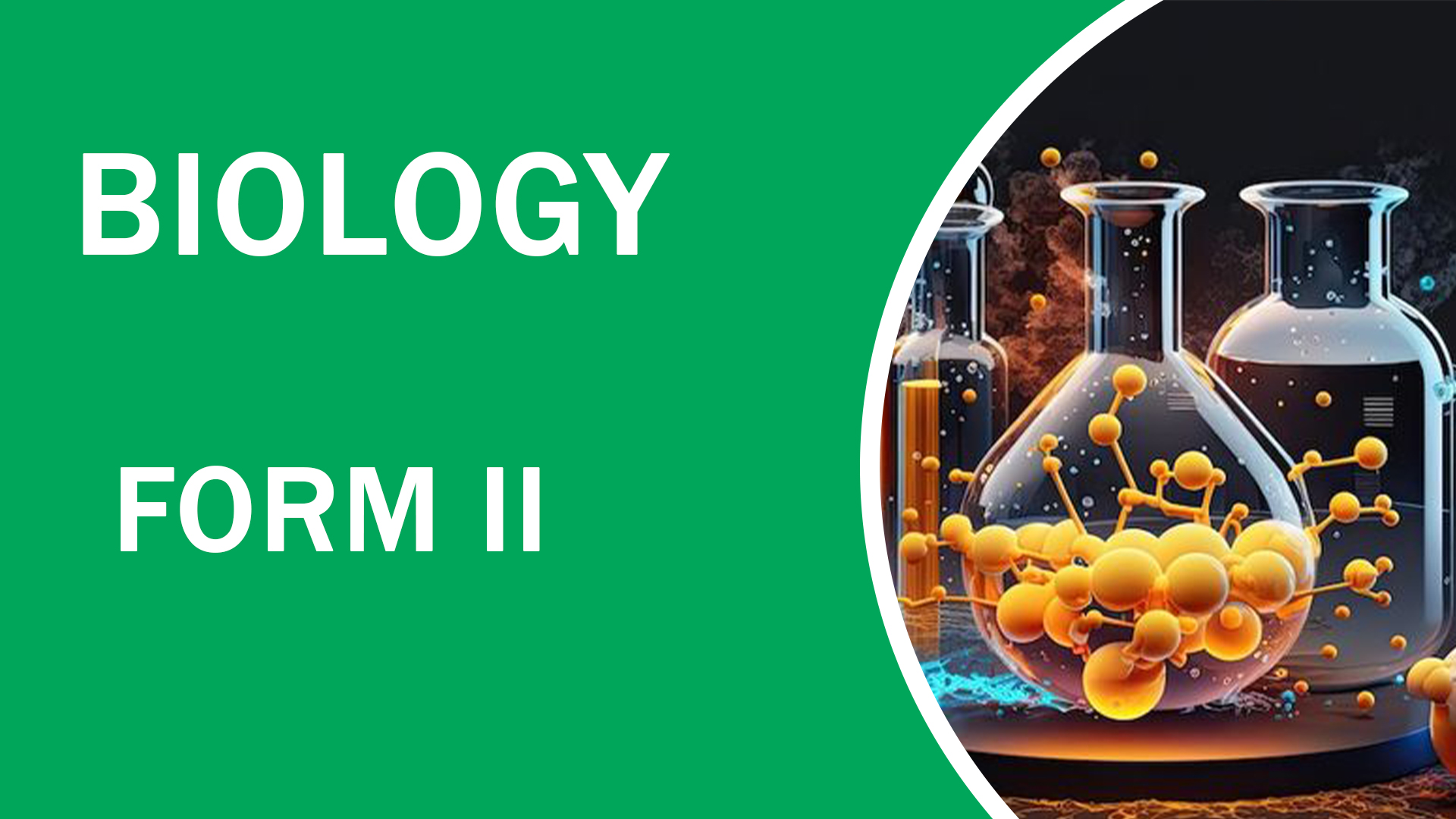Here’s a Biology Form II Outcomes section for your Edukea website videos:
Biology Form II: Learning Outcomes
Upon completing the Biology Form II course, you will be able to:
-
Understand the Fundamental Concepts of Biology: Demonstrate a deep understanding of key biological concepts, including cell structure, human anatomy, genetics, and ecology, and how these concepts interconnect in the study of life.
-
Analyze and Explain the Structure and Function of Cells: Describe the structure and functions of different types of cells, including plant and animal cells, and understand their roles in living organisms.
-
Investigate the Human Body Systems: Understand the structure and function of human body systems (e.g., circulatory, respiratory, digestive, and excretory systems) and explain how they work together to maintain homeostasis and support life.
-
Explore the Principles of Genetics and Heredity: Gain a solid understanding of genetics, including the concepts of inheritance, DNA, genes, and the mechanisms behind genetic variation and trait transmission.
-
Understand Ecological Relationships: Study ecosystems and the interactions between organisms and their environment. Understand the flow of energy in ecosystems, including food webs and trophic levels, and the impact of human activities on biodiversity.
-
Explain the Process of Reproduction: Understand the processes of sexual and asexual reproduction in plants and animals, including the role of gametes, fertilization, and the transmission of genetic material.
-
Conduct Biological Investigations: Develop skills in designing and conducting biological experiments, making observations, collecting data, and analyzing results using scientific methods.
-
Apply Biological Knowledge to Real-World Situations: Connect biological concepts to everyday life and global issues, such as healthcare, environmental conservation, and biotechnology, and recognize the relevance of biology in solving contemporary problems.
-
Enhance Critical Thinking and Problem-Solving Skills: Use critical thinking and problem-solving skills to analyze biological processes and phenomena, making logical connections between theory and real-life applications.
By the end of the course, you will have a comprehensive understanding of biological principles and be prepared to apply this knowledge in both academic and practical settings, including in future studies or careers in the biological sciences.
These outcomes provide a clear understanding of what students can expect to learn and achieve in the course. Let me know if you'd like any adjustments!
Here’s a Biology Form II Requirements section for your Edukea website videos:
Biology Form II: Course Requirements
To ensure that you have the best experience and success in your Biology Form II studies, please ensure that you meet the following requirements:
-
Basic Knowledge of Biology (Form I): A foundational understanding of basic biology concepts from Form I, such as the structure of living organisms, basic cell biology, and the diversity of life, will be helpful for your progression in Form II.
-
Basic Understanding of Scientific Terms: Familiarity with basic scientific terminology (e.g., cells, tissues, organs, ecosystems) is important for comprehending more advanced topics in biology.
-
Mathematics Skills: While this is not a math-heavy course, you will need basic math skills to understand topics such as genetics (probability and ratios), ecological calculations, and experimental data analysis.
-
Access to a Notebook and Stationery: Keep a notebook or digital tool handy to take notes, sketch diagrams, and record important information. A pen, pencil, ruler, and eraser will also be necessary for practical exercises.
-
Curiosity and Active Participation: Biology is a subject that thrives on curiosity. Engage with the lessons, ask questions, and explore the topics beyond the classroom to truly understand the natural world.
-
Access to a Scientific Calculator: While advanced calculations are not required, a scientific calculator may help with understanding measurements, data interpretation, and calculations in certain topics like genetics.
-
Practical Observation and Experimentation: Being open to conducting practical experiments and observations will enhance your understanding of biological concepts. Access to a microscope, if possible, will aid in exploring cellular structures.
-
Interest in the Living World: A genuine interest in understanding the biology of life on Earth, from cells to ecosystems, will make your learning experience more enjoyable and rewarding.
These requirements will help ensure that you are well-prepared for your learning journey in Biology Form II. Let me know if you'd like any changes!
Here’s a Biology Form II Description for your Edukea website videos:
Biology Form II: Exploring the Living World
Welcome to Biology Form II! This course takes you deeper into the fascinating world of life science, expanding on the foundation you built in Form I. In this series, we explore the complexity and beauty of living organisms, their structures, functions, and the environment they interact with.
In these lessons, we will cover essential topics, including:
- Cell Biology: Dive into the structure and functions of cells, the building blocks of life. Learn about the various organelles, cell processes, and the vital role of cells in the survival of organisms.
- Human Anatomy and Physiology: Explore the systems that make up the human body, including the circulatory, respiratory, digestive, and excretory systems. Understand how each system works together to maintain life.
- Ecology and Environment: Study the relationships between organisms and their environment, including ecosystems, food chains, and the impact of human activities on the planet.
- Reproduction: Learn about the different types of reproduction in living organisms, including sexual and asexual reproduction, and how genetic material is passed on.
- Genetics and Heredity: Understand the principles of inheritance, DNA, genes, and how traits are passed from one generation to the next.
Each video is designed to break down complex concepts into easy-to-understand lessons, with clear explanations and real-world applications. Whether you're studying for exams or simply curious about the world around you, this course will deepen your understanding of biology.
Join us on this journey through the living world and gain a solid understanding of how life works at the cellular, systemic, and ecological levels.
Feel free to tweak it to suit your needs! Let me know if you'd like any changes or additions.
